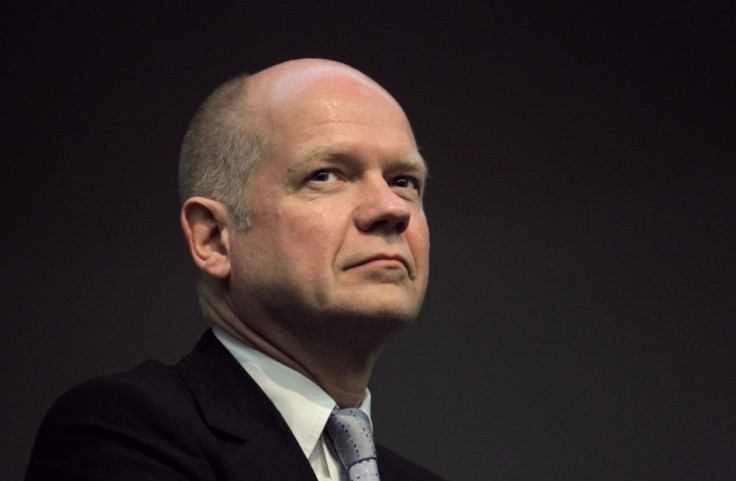William Hague on Iran Nuclear Crisis: All Options Open

All options including military action are open to Britain over how it handles the Iran nuclear crisis, foreign secretary William Hague has told MPs.
European and US sanctions are beginning to bite in Iran, which is locked in a diplomatic crisis with Israel and the West over its uranium enrichment programme.
President Mahmoud Ahmadinejad has said the programme is peaceful and is designed for civil energy purposes but he has been accused of trying to develop a nuclear weapon.
"It is indisputable that Iran has sought to conceal its enrichment programme," Hague told the foreign affairs select committee.
"We have never asserted that Iran has manufactured a nuclear weapon but that may very well be something they have in mind.
"We cannot just await a time when Iran can perform a rapid breakout from the non-proliferation treaty.
"It is our position that options are not taken off the table."
His preferred option was a peaceful, diplomatic solution. The UK would approach Iran positively "in a spirit of trying to reach an agreement", he said.
He repeated Britain's offer of helping Iran develop civil nuclear energy if it could demonstrate it had no intention of developing a nuclear bomb.
US president Barack Obama upped the stakes recently when said that he would use force if necessary to prevent Iran from building a nuclear weapon.
John Baron, a Conservative MP who sits on the committee, said Iran has an "instinct of defiance" and that the West's policy amounts to "sabre-rattling" which only goes to reinforce that defiance.
Hague denied that.
Baron held a parliamentary debate in February calling on the UK to rule out military intervention.
Assad's Syrian Army 'Like Nazi Death Squad'
MPs also questioned Hague over the violence in Syria where President Bashar al-Assad is slaughtering thousands of civilians to quell the uprising off the back of the Arab Spring.
Sir John Stanley, a Conservative MP on the committee, compared Assad's armies roaming the neighbourhoods of Syrian towns and cities to the Nazi SS death squads of World War Two.
Hague said the UK wanted a "political transition". A violent overthrow, supported by the West, would cause many problems, he said.
"I don't rule out supplying non-lethal help [to the rebels]," said Hague, though he highlighted the practical and logistical difficulties of getting aid into the country while it is locked down, as well as being unable to track who gets hold of the aid.
He said the UK was working to gather evidence of the atrocities in Syria to use when Assad is eventually brought to justice.
"It is an appalling and unacceptable situation," Hague said, explaining that Britain was still pushing for a UN resolution condemning the slaughter but that Russia and China were standing in the way.
"We are concentrating our efforts at the UN security council on securing a resolution with Russia and China," he said.
"China and Russia are paying a diplomatic price in the Arab world."
Both countries have vetoed two UN resolutions, which call for Assad to stand down.
Hague argued that it would be in their interests to call for the removal of Assad because a future Syrian government might view them as enemies.
© Copyright IBTimes 2024. All rights reserved.






